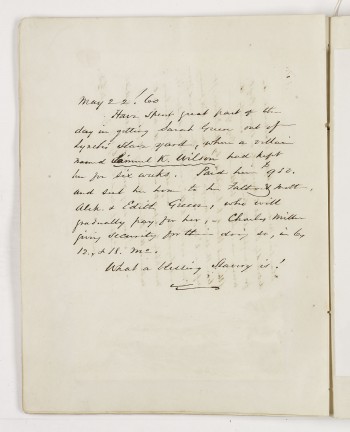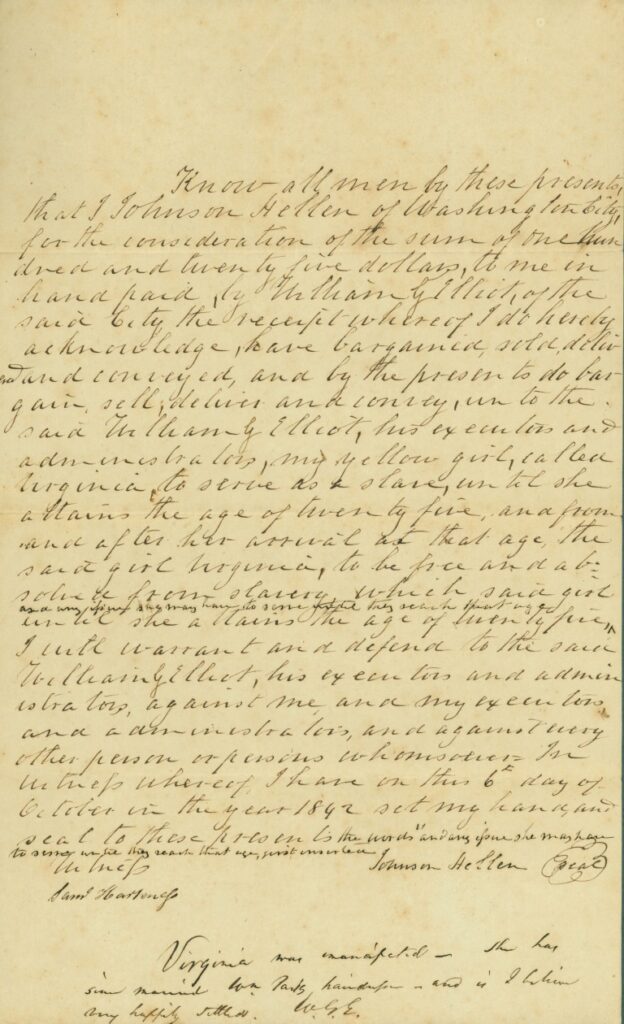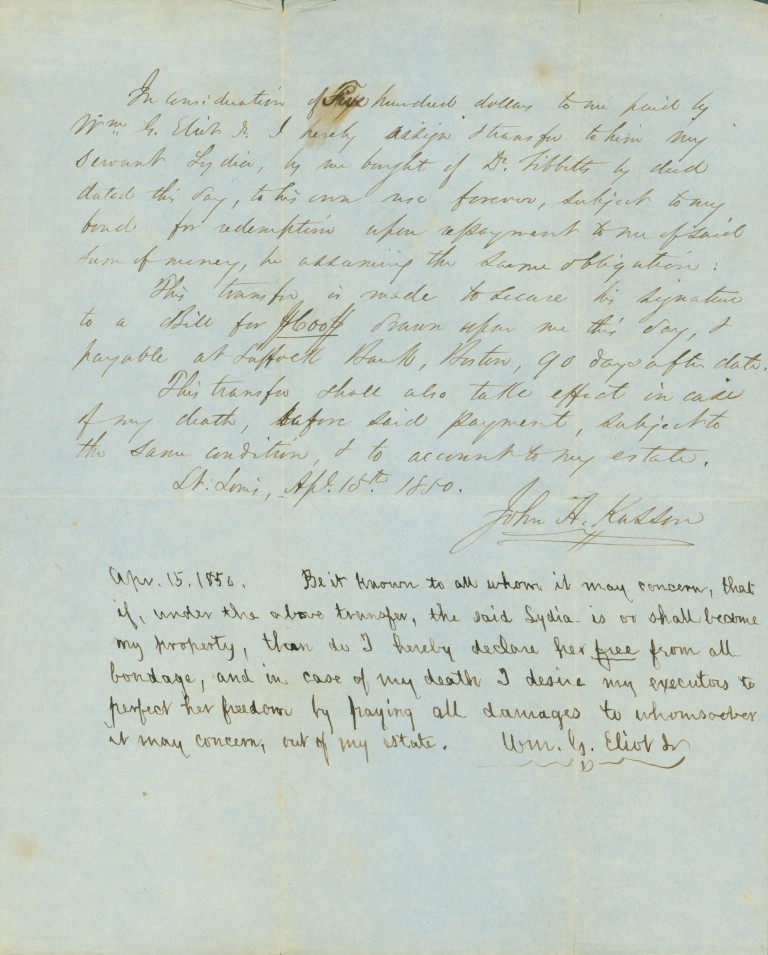
Slavery & Abolition: From the Desk of William Greenleaf Eliot
Although William Greenleaf Eliot was a moderate abolitionist, he frequently practiced anti-slavery activism in St. Louis. His primary form of protest was to use his personal funds to buy slaves and then set them free. This policy demonstrates his belief in gradual emancipation, which, rather than demanding a radical law to free them all at once, called for individuals to slowly give up slaves as property so as to avoid social upheaval.
The following examples of slave purchase receipts are very useful for social historians, scholars who study the vagaries of everyday life.
Social historians of the Civil War can use these sources to demonstrate price fluctuations, relationships between slave holders, and narratives of slave transport. The receipts pertaining to Eliot are especially revealing because they disclose his participation in the local slave economy as an abolitionist, something that would seem very distasteful to abolitionists from northern states. However, it would have been very difficult to completely avoid participation in the slave economy, as even materials made of cotton or molasses came from slave production.
May 22! [18]60 Have spent great part of the day in getting Sarah Green out of Lynch’s slave yard, where a villain named Samuel K. Wilson had kept her for six weeks. Paid him $950. and sent her home to her Father & Mother, Alek. & Edith Green, who will gradually pay for her, – Charles Miller giving security for their doing so, in 6., 12., & 18. Mo[nths]. What a blessing Slavery is!
Eliot Notebook 5, page 34.
Know – all men by these presents, that I Johnson Hellen of Washington City, for the consideration of the sum of one hundred and twenty five dollars, to me in hand paid, by William G. Elliot, of the said City, the receipt where of I do hereby acknowledge, have bargained, sold, delivered and conveyed, and by the presents do bargain, sell, deliver and convey, unto the said William G. Elliot, his executors and administrators, my yellow girl, called Virginia, to serve as a slave, until she attains the age of twenty five, and from and after her arrival at that age, the said girl Virginia, to be free and absolved from slavery which said girl until she attains the age of twenty five, and any issue she may have to serve until they search that age, I will warrant and defend to the said William G. Elliot, his executors and administrators, against me and my executors and administrators, and against every other person or persons whomsoever. In witness whereof, I have on this 6th day of October in the year 1842 set my hand, and seal to these presents the words and any issue she may have to serve until they reach that age, first inserted. Witness Johnson Hellen {seal} Sam [Harkness] Virginia was emancipated – she has since married Wm. Parks, handyman – and is I believe very happily settled. W.G.E.
Eliot correspondence, Box 01, Folder 1842
From Frank Kassin:
In consideration of Five hundred dollars to me paid by Wm. G. Eliot Jr. I hereby assign and transfer to him my servant Lydia, by me bought of Dr. Libbitt, by deed dated this day, to his own use forever, subject to my bond for redemption when repayment to me of said sum of money, be assuming the same obligation: This transfer is made to secure his signature to a Bill for $600$ drawn upon me this day, and payable at [Laffock] Bank, Boston, 90 days after date. This transfer shall also take effect in case of my death, [before] said payment, subject to the same condition, and to account to my estate. St. Louis, Ap[ri]l. 15th. 1850. John A Kassin
Series 03 Box 01, Folder 1850
Reply by Eliot:
Apr. 15. 1850. Be it known to all whom it may concern, that if, under the above transfer, the said Lydia is or shall become my property, then do I hereby declare her free from all bondage, and in case of my death I desire my executors to perfect her freedom by paying all damages to whomsoever it may concern, out of my estate. Wm. G. Eliot Jr.
William Greenleaf Eliot Personal Papers, Series 03, folder 1850. 15 April.
Until the 1850s, slavery had been a widespread phenomenon in St. Louis, slaves making up an estimated 15.3 percent of the city’s population by 1820. By the time Eliot purchased Sarah Green in 1860 (first document above), the practice of owning slaves had heavily declined, mostly as a result of a recent population explosion of immigrants from Germany and Ireland. Eliot purchased Green for $950 from Samuel K. Wilson. Wilson had kept Green for six weeks at Bernard M. Lynch’s slave pen, a two-story brick building located just south of the downtown courthouse on Myrtle Street.
By the end of the war, Missourians were divided on the subject of slavery. For instance, the passing of the Emancipation Proclamation into law was met with fanfare in the city and criticism in the rest of the state. As William C. Winter writes in The Civil War in St. Louis: A Guided Tour, “Although many Missourians regarded the Constitutional Convention as a radical body whose views did not represent most Missourians, St. Louisans welcomed the Emancipation Ordinance with great enthusiasm. Three days after its adoption, sixty cannon roared in salute as church bells rang and thousands celebrated in the streets.”
To find out more about Eliot, please consult the William Greenleaf Eliot Personal Papers located at the University Archives and this research guide. From the research guide you can link to more of Eliot’s online collection by perusing his materials at Missouri Digital Heritage, including reading more from Notebook 5.
Sources
- Rev. Dr. Earl K. Holt III, William Greenleaf Eliot: Conservative Radical;
- William C. Winter, The Civil War in St. Louis: A Guided Tour.


